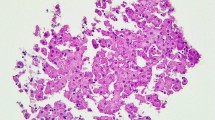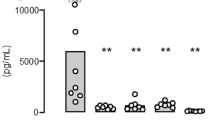Abstract
Previous studies have shown that baicalin, an active ingredient of the Chinese traditional medicine Huangqin, attenuates LPS-induced inflammation by inhibiting the activation of TLR4/NF-κBp65 pathway, but how it affects this pathway is unknown. It has been shown that CD14 binds directly to LPS and plays an important role in sensitizing the cells to minute quantities of LPS via chaperoning LPS molecules to the TLR4/MD-2 signaling complex. In the present study we investigated the role of CD14 in the anti-inflammatory effects of baicalin in vitro and in vivo. Exposure to LPS (1 μg/mL) induced inflammatory responses in RAW264.7 cells, evidenced by marked increases in the expression of MHC II molecules and the secretion of NO and IL-6, and by activation of MyD88/NF-κB p65 signaling pathway, as well as the expression of CD14 and TLR4. These changes were dose-dependently attenuated by pretreatment baicalin (12.5–50 μM), but not by baicalin post-treatment. In RAW264.7 cells without LPS stimulation, baicalin dose-dependently inhibit the protein and mRNA expression of CD14, but not TLR4. In RAW264.7 cells with CD14 knockdown, baicalin pretreatment did not prevent inflammatory responses and activation of MyD88/NF-κB p65 pathway induced by high concentrations (1000 μg/mL) of LPS. Furthermore, baicalin pretreatment also inhibited the expression of CD14 and activation of MyD88/NF-κB p65 pathway in LPS-induced hepatocyte-derived HepG2 cells and intestinal epithelial-derived HT-29 cells. In mice with intraperitoneal injection of LPS and in DSS-induced UC mice, oral administration of baicalin exerted protective effects by inhibition of CD14 expression and inflammation. Taken together, we demonstrate that baicalin pretreatment prevents LPS-induced inflammation in RAW264.7 cells in CD14-dependent manner. This study supports the therapeutic use of baicalin in preventing the progression of LPS-induced inflammatory diseases.
Similar content being viewed by others
Log in or create a free account to read this content
Gain free access to this article, as well as selected content from this journal and more on nature.com
or
References
Medzhitov R. Origin and physiological roles of inflammation. Nature. 2008;454:428–35.
Dinda B, Dinda S, DasSharma S, Banik R, Chakraborty A, Dinda M. Therapeutic potentials of baicalin and its aglycone, baicalein against inflammatory disorders. Eur J Med Chem. 2017;131:68–80.
Doyle SL, O'Neill LAJ. Toll-like receptors: from the discovery of NF-kappaB to new insights into transcriptional regulations in innate immunity. Biochem Pharmacol. 2006;72:1102–13.
Girardin SE, Boneca IG, Viala J, Chamaillard M, Labigne A, Thomas G, et al. Nod2 is a general sensor of peptidoglycan through muramyl dipeptide (MDP) detection. J Biol Chem. 2003;278:8869–72.
Yin XX, Krikorian P, Logan T, Csizmadia V. Induction of RIP-2 kinase by proinflammatory cytokines is mediated via NF-kappa B signaling pathways and involves a novel feed-forward regulatory mechanism. Mol Cell Biochem. 2010;333:251–9.
Zanoni I, Ostuni R, Marek LR, Barresi S, Barbalat R, Barton GM, et al. CD14 controls the LPS-induced endocytosis of toll-like receptor 4. Cell. 2011;147:868–80.
Wright SD, Ramos RA, Tobias PS, Ulevitch RJ, Mathison JC. CD14, a receptor for complexes of lipopolysaccharide (LPS) and LPS binding protein. Science. 1990;249:1431–33.
Moore KJ, Andersson LP, Ingalls RR, Monks BG, Li R, Arnaout MA, et al. Divergent response to LPS and bacteria in CD14-deficient murine macrophages. J Immunol. 2000;165:4272–80.
Deng XL, Liu Q, Fu YJ, Luo X, Hu MH, Ma FL, et al. Effects of Lycium barbarum polysaccharides with different molecular weights on function of RAW264.7 macrophages. Food Agr Immunol. 2018;29:808–20.
Deng XL, Li XL, Luo S, Zheng YY, Luo X, Zhou L. Antitumor activity of Lycium barbarum polysaccharides with different molecular weights: an in vitro and in vivo study. Food Nutr Res. 2017;61:1399770.
Luo S, Deng XL, Liu Q, Pan ZF, Zhao ZX, Zhou L, et al. Emodin ameliorates ulcerative colitis by the flagellin-TLR5 dependent pathway in mice (vol 59, pg 269, 2018). Int Immunopharmacol. 2018;62:337.
Ye L, Tao YH, Wang YM, Feng T, Li H. The effects of baicalin on the TLR2/4 signaling pathway in the peripheral blood mononuclear cells of a lipopolysaccharide-induced rat fever model. Int immunopharmacol. 2015;25:106–11.
Yun Y, Wang CZ, Gui L, Li ZX. Effect of baicalin on expression of TLR4 in RAW264.7 cells infected by ESBLs Escherichia coli. Zhongguo Zhong yao za zhi = Zhongguo zhongyao zazhi = China J Chin Mater Med. 2013;38:1590–4.
Flannery S, Bowie AG. The interleukin-1 receptor-associated kinases: critical regulators of innate immune signalling. Biochem Pharmacol. 2010;80:1981–91.
Su GL, Dorko K, Strom SC, Nussler AK, Wang SC. CD14 expression and production by human hepatocytes. J Hepatol. 1999;31:435–42.
Bas S, Gauthier BR, Spenato U, Stingelin S, Gabay C. CD14 is an acute-phase protein. J Immunol. 2004;172:4470–9.
Zhang CL, Zhang S, He WX, Lu JL, Xu YJ, Yang JY, et al. Baicalin may alleviate inflammatory infiltration in dextran sodium sulfate-induced chronic ulcerative colitis via inhibiting IL-33 expression. Life Sci. 2017;186:125–32.
Dong SJ, Zhong YQ, Lu WT, Li GH, Jiang HL, Mao B. Baicalin inhibits lipopolysaccharide-induced inflammation through signaling NF-kappaB pathway in HBE16 airway epithelial cells. Inflammation. 2015;38:1493–501.
Guo MY, Zhang NS, Li DP, Liang DJ, Liu ZC, Li FY, et al. Baicalin plays an anti-inflammatory role through reducing nuclear factor-kappa B and p38 phosphorylation in S. aureus-induced mastitis. Int Immunopharmacol. 2013;16:125–30.
Plociennikowska A, Hromada-Judycka A, Borzecka K, Kwiatkowska K. Co-operation of TLR4 and raft proteins in LPS-induced pro-inflammatory signaling. Cell Mol Life Sci. 2015;72:557–81.
Ming L. siRNA targeting mCD14 inhibits TNF-α, MIP-2, and IL-6 secretion and NO production from LPS-induced RAW264.7 cells. Appl Microbiol Biotechnol. 2011;92:115.
Garg AD, Kaczmarek A, Krysko O, Vandenabeele P, Krysko DV, Agostinis P. ER stress-induced inflammation: does it aid or impede disease progression? Trends Mol Med. 2012;18:589–98.
Wan Y, Fu YQ, Wang FL, Sinclair AJ, Li D. Protective effects of a lipid extract from Hard-Shelled Mussel (Mytilus coruscus) on intestinal integrity after lipopolysaccharide challenge in mice. Nutrients. 2018;10:860.
Cui Y, Wang Q, Sun R, Guo L, Wang M, Jia J, et al. Astragalus membranaceus (Fisch.) Bunge repairs intestinal mucosal injury induced by LPS in mice. BMC Complement Alter Med. 2018;18:230.
Buchheister S, Buettner M, Basic M, Noack A, Breves G, Buchen B, et al. CD14 plays a protective role in experimental Inflammatory bowel disease by enhancing intestinal barrier function. Am J Pathol. 2017;187:1106–20.
Ortega-Cava CF, Ishihara S, Rumi MA, Kawashima K, Ishimura N, Kazumori H, et al. Strategic compartmentalization of toll-like receptor 4 in the mouse gut. J Immunol. 2003;170:3977–85.
Kamada N, Hisamatsu T, Okamoto S, Chinen H, Kobayashi T, Sato T, et al. Unique CD14 intestinal macrophages contribute to the pathogenesis of Crohn disease via IL-23/IFN-gamma axis. J Clin Invest. 2008;118:2269–80.
Thiesen S, Janciauskiene S, Uronen-Hansson H, Agace W, Hogerkorp CM, Spee P, et al. CD14(hi)HLA-DR(dim) macrophages, with a resemblance to classical blood monocytes, dominate inflamed mucosa in Crohn’s disease. J Leukoc Biol. 2014;95:531–41.
Guo S, Al-Sadi R, Said HM, Ma TY. Lipopolysaccharide causes an increase in intestinal tight junction permeability in vitro and in vivo by inducing enterocyte membrane expression and localization of TLR-4 and CD14. Am J Pathol. 2013;182:375–87.
Acknowledgements
This work was supported by the National Natural Science Foundation of China [Grant numbers 81703785, 81673668]; the Characteristic Innovation Projects of Colleges and Universities in Guangdong Province, China [Grant number 2017KTSCX042]; and the Natural Science Foundation of Guangdong Province [Grant number 2017A030313657].
Author information
Authors and Affiliations
Contributions
XLD and LZ contributed to the conception and design of the study. YJF, XL, BX, SWH, CL, QW, SL, and JYC contributed to the acquisition of data. YJF and XL analyzed the data. YJF and XLD wrote the manuscript. XLD, LZ, and XL contributed to the material and technological support. All authors read and approved the manuscript.
Corresponding authors
Ethics declarations
Conflict of interest
The authors declare that they have no conflict of interest.
Supplementary information
Rights and permissions
About this article
Cite this article
Fu, Yj., Xu, B., Huang, Sw. et al. Baicalin prevents LPS-induced activation of TLR4/NF-κB p65 pathway and inflammation in mice via inhibiting the expression of CD14. Acta Pharmacol Sin 42, 88–96 (2021). https://doi.org/10.1038/s41401-020-0411-9
Received:
Accepted:
Published:
Version of record:
Issue date:
DOI: https://doi.org/10.1038/s41401-020-0411-9
Keywords
This article is cited by
-
High-CD14-expressing urothelial cancer cells foster a neutrophil-rich tumor microenvironment that increases the risk of radiation-promoted distant metastasis
Journal of Biomedical Science (2026)
-
eIF6 deficiency alleviates colorectal cancer by modulating the gut microbiota and related metabolites
Cell Death & Differentiation (2026)
-
Baicalin: bridging traditional medicine and modern science in food and functional applications
Naunyn-Schmiedeberg's Archives of Pharmacology (2026)
-
Advances in antivirulence natural products targeting the suilysin of Streptococcus suis
Animal Diseases (2025)
-
Comparative study of the effects of baicalin and probenecid on microRNA expression profiles in porcine aortic vascular endothelial cells infected by Glaesserella parasuis
BMC Veterinary Research (2025)



